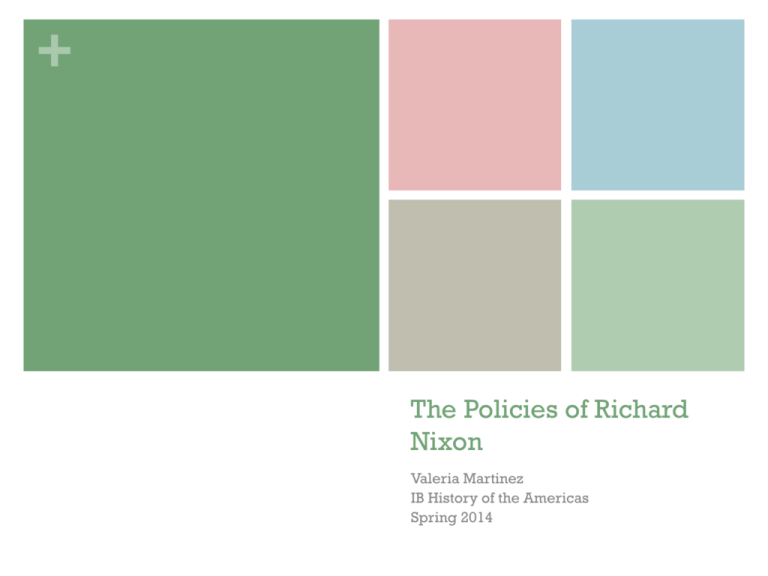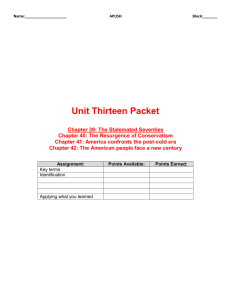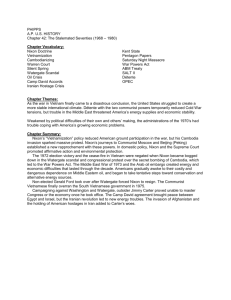The Policies of Richard Nixon
advertisement

+ The Policies of Richard Nixon Valeria Martinez IB History of the Americas Spring 2014 + Richard Nixon Born in California on January 9, 1913. Became the nation’s 37th president on January 20th 1969 until he became the only President to date to resign from office on August 9th 1974. He was a member of the Republican party, and had previously been both a US Senator from California as well as the Vice President under President Eisenhower. Achieved many diplomatic victories in countries such as the Soviet Union and the People’s Republic of China. + The Policy of Détente “Détente” is a French word meaning “release from tension.” Specifically, détente refers to the period of time that marked an improved relationship between the United States and the Soviet Union. Tentatively started in 1971 and really took off in May 1972 when President Nixon visited the secretary-general of the Soviet Communist Party, Leonid I. Brezhnev. + Reasons Behind Détente Among the reasons both countries decided to adopt the policy of détente was because they would both benefit if they increased trade with each other, and decreased the immediate threat of nuclear warfare. President Nixon was also up for reelection, and wanted to please American citizens who demanded social change, racial equality, and an end to the Vietnam War. Part of the détente policy was signing seven agreements that covered the prevention of accidental military clashes, arms control, cooperating in research (because of recent space exploration), and expanding their shared commerce. Détente came to an end when President Ronald Reagan was elected. + SALT I + SALT I The first series of Strategic Arms Limitation Talks. Lasted from November 1969 to May 1972. During this time, the United States and the Soviet Union began negotiating agreements to put limits and restraints on central and important armaments. Two treaties were reached by the end of SALT I: Anti-Ballistic Missile Treaty (ABM), and the Interim Agreement of the Limitation of Strategic Offensive Arms. + Treaties During SALT I Anti-Ballistic Missile Treaty (ABM) – Treaty between the US and the Soviet Union that limited anti-ballistic missile systems that were used to defend areas against missile delivered nuclear weapons. An anti-ballistic missile is a missile used to shoot down ballistic missiles Interim Agreement on the Limitation of Strategic Offensive Arms – was meant to complement the ABM and to limit the competition in making offensive strategic arms. It was meant to be limited in duration, and only halted the production of more offensive strategic arms to give time for further negotiations. + Leonid Brezhnev Born December 19, 1906 Became the most powerful man in Soviet politics after his predecessor faced major embarrassment following the end of the Cuban Missile Crisis. Presided over the Soviet Union longer than anyone else except Joseph Stalin. Known for his policies of détente which thawed the U.S-Soviet relations. + Richard Nixon & Leonid Brezhnev Nixon and Brezhnev met a total of three times for three different summits while they were both in office. These meetings totaled over one hundred hours of time. President Nixon famously said in one of his memoirs that “I felt that the relationship between the United States and the Soviet Union would probably be the single most important factor in determining whether the world would live at peace during and after my administration.” The two had a cordial friendship that helped with their arms negotiations. + Warsaw Pact Included the Soviet Union, Albania, Poland, Romania, Hungary, Easy Germany, Czechoslovakia, and Bulgaria. This alliance created a Soviet Union dominated military that called on members to come to the defense of any other member if they were attacked by an outside force. + Soviet Invasion of Czechoslovakia Also known as the Warsaw Pact Invasion of Czechoslovakia. The Soviet Union and its allies through the Warsaw Pact invaded the Czechoslovak Socialist Republic in order to stop the Prague Spring. The Prague Spring was a period of political liberalization in Czechoslovakia that deviated from Communism, and was led by Alexander Dubček. Prague Spring stopped by this invasion. + Brezhnev Doctrine Doctrine set into place by Leonid Brezhnev that affirmed the right of the Soviet Union to intervene in the affairs of Communist countries in order to strengthen Communism. It was announced in order to justify the Soviet invasion of Czechoslovakia. Western powers did not approve of the Brezhnev Doctrine, but they did not offer aid to the affected countries. + Opening of China Refers to President Nixon’s trip to China from February 21 to February 28, 1972. The first time a U.S. President visited the People’s Republic of China – ended 25 years of separation between the two counties. By “opening China” the United States would have more leverage in relations with the Soviet Union. “The week that changed the world.” + Primary Source 656-10 Excerpt 1 (1:24) January 26, 1972 RN, Barend Biesheuvel, Alexander Haig, and J. William Middendorf RN: Uh, we do believe that by starting the long process of some sort of contact, there will--I will say, obviously, it will not come to recognition on our part— BB: No. RN: --because it cannot, since we still recognize Taiwan and will continue to honor our treaty commitments. They know this will not come out. What may come out of it will be, uh, however, uh, uh, some method of communication in the future, uh, some contact in the future, uh, and perhaps reducing the chance in the immediate future of a confrontation between the United States and the PRC in Asia, such as we had in Korea, and such as we had indirectly in Vietnam. And looking further in the future, uh, when they become a super power, a nuclear super power, uh, to be in a position that at that time, uh, we will have such relations with them that, uh, we, uh, can discuss differences and, and not inevitably have a clash. Now, also, no one can look at Asia, uh, and take 750 million Chinese out of it and say you can have any policy in the Pacific that will succeed in preventing war without having the Chinese a part of it. It’s just as cold- blooded as that. + Primary Source Analysis Origin: This is an Oval Office metting with Barend Biesheuvel, Alexander Haig, and J. William Middendorf. Purpose: The purpose of this meeting was for President Nixon to explain his reasons behind making a trip to China. Value: This primary source is very valuable because it is a recorded conversation from the Oval Office during the time Nixon was President. It allows one to see his way of thinking. Limitation: Because Nixon knew that everything he said in the Oval Office was recorded, he could have left key information out and been dishonest while talking. + CIA Involvement in Chile In 1970, Salvador Allende became the first Socialist president of Chile. When economic ties with the United States and western European nations were cut, he made relations with Cuba and China. President Nixon feared that Chile would “become the next Cuba.” The United States had been trying to support antiCommunist forces in Chile since the 1950s, and Allende’s rise to power posed a serious threat to United States interests. + CIA Involvement with Chile The CIA created two plans called Track I and Track II Part of the Track I strategy was to prevent Allende from taking office, because he only narrowly won. When Allende did take office, millions of dollars where given to opposing political parties. As a part of Track II, the CIA was directed to instigate a coup to prevent Allende from taking office. + CIA Involvement with Chile As documents released years later reveal, CIA officials were aware that as part of Title II, one of the groups that they supported would kidnap Chilean Army Commander Rene Schneider, who would later be killed. The CIA did not directly plan the coup that ended President Allende’s government in 1973, but they did have knowledge of it taking place, and in fact encouraged it. The CIA claims no responsibility in terms of the way Allende was brought down, and says they had no part in him refusing help and ultimately killing himself. + Watergate Scandal On June 17, 1972, several robbers were caught and arrested inside the office of the Democratic National Committee. They had been trying to wiretap phones and steal secret documents. The worst thing is that the burglars were connected to President Nixon’s reelection campaign. In August of 1972, President Nixon gave a speech in which he said that neither he, nor his staff were involved in any way with the break in. Washing Post writers Bob Woodward and Carl Bernstein are credited with uncovering the details of the Watergate scandal, with a secret informant known as “Deep Throat”. It was later revealed Deep Throat was W. Mark Felt, a former associate director of the FBI + Watergate Scandal It later came to light that Nixon was indeed involved with the break-in. He gave hundreds of thousands of dollars to the burglars. This was known as “hush-money”. Began a plan to instruct the CIA to stop the FBI’s investigation of the crime. Seven conspirators were indicted on charged relating to the scandal. Many of Nixon’s aides testified before a grand jury that Nixon had secretly taped every conversation that took place in the Oval Office. + Watergate Scandal The Supreme Court eventually ordered Nixon to turn over all of the tapes. Before he did, the House of Representatives voted to impeach him. On August 5, 1974, President Nixon finally released the tapes, which undeniably showed that he was involved in the Watergate crimes. Rather than get impeached by the Senate, President Nixon resigned on August 9, 1974. Six weeks after President Ford took office, he pardoned Nixon for any crimes he committed or might have committed while in office. + Other Domestic Issues President Nixon advocated what he called “New Federalism” in which he wanted to return power to the state and local governments. Faced many issues with the economy because of President Johnson and his Great Society. President Nixon tried to fix the problem by implementing wage and price controls, although they ultimately hurt the economy. He also created the Environmental Protection Agency, and became the most environmentally friendly president, after President Theodore Roosevelt. + Works Cited History.com Staff. "Detente." History.com. A+E Networks, 2009. Web. 23 Apr. 2014. <http://www.history.com/topics/co ld-war/detente>. Murad, Lindsey. "SALT I and II." ColdWar.org. The Cold War Museum. Web. 23 Apr. 2014. <http://www.coldwar.org/articles/7 0s/SALTIandII.asp>. "SALT I." U.S. Department of State. U.S. Department of State.Web. 22 Apr. 2014.< http://www.state.gov/www/global/ arms/treaties/salt1.html> "Interim Agreement Between The United States of America and The Union of Soviet Socialist Republics on Certain Measures With Respect to the Limitation of Strategic Offensive Arms." U.S. Department of State. U.S. Department of State, n.d. Web. 23 Apr. 2014. <http://www.state.gov/t/isn/4795.h tm>. Trueman, Chris. "Leonid Brezhnev." Leonid Brezhnev. History Learning Site, Web. 23 Apr. 2014. <http://www.historylearningsite.co. "IB Guides." IB History Notes. Web. 24 Apr. 2014. <http://ibguides.com/history/note s/domestic-and-foreign-problemsof-the-brezhnev-era-economic-andpolitical-stagnation-afghanistan>. "CIA Activities in Chile." Central Intelligence Agency. Central Intelligence Agency, 19 June 2013. Web. 25 Apr. 2014. <https://www.cia.gov/library/repor ts/general-reports-1/chile/#1>. "Warsaw Pact - Definition of the Warsaw Pact." About.com European History. N.p., n.d.Web. 24 Apr. 2014. <http://europeanhistory.about.com /od/glossary/g/glwarsawpact.htm >. The Editors of Encyclopædia Britannica. "Salvador Allende (president of Chile)." Encyclopedia Britannica Online. Encyclopedia Britannica, n.d.Web. 25 Apr. 2014. <http://www.britannica.com/EBche cked/topic/16237/SalvadorAllende>. “The Warsaw Pact is formed.” 2014. The History Channel website. Apr 24 2014, 11:08 <http://www.history.com/this-dayin-history/the-warsaw-pact-isformed> "Nixon and Brezhnev – Partners in Detente." The New Nixon. Nixon Foundation, n.d.Web. 24 Apr. 2014. <http://blog.nixonfoundation.org/2 010/07/nixon-and-brezhnevpersonal-partners-in-detente/>. “Nixon visits China.” 2014. The History Channel website. Apr 25 2014, 12:09 http://<www.history.com/this-dayin-history/nixon-visits-china> History.com Staff. "Watergate Scandal." History.com. A&E Television Networks, 2009. Web. 22 Apr. 2014. <http://www.history.com/topics/wa tergate>. "Richard Nixon: Domestic Policy." Examiner.com Web. 24 Apr. 2014. <http://www.examiner.com/article /richard-nixon-domestic-policy>.





